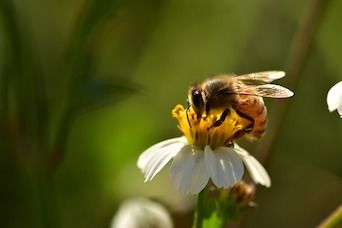Honey Bees: World's Most Important Species of Pollinator
An unprecedented study has discovered that honey bees are, in fact, the most important and frequent floral visitor in natural habitats worldwide.

The Veterinary Feed Directive, which took effect over a year ago, has given veterinarians more responsibility when it comes to bees. And new research shows that this partnership may be a good thing, seeing as honey bees are the world’s key pollinator of noncrop plants.
The study, published in Proceedings of the Royal Society B, has shown that honey bees are not only a key contributor to natural ecosystem functions but that they are the single most important species of pollinator in natural ecosystems across the globe.
"Biologists have known for a while that honey bees are widespread and abundant,” said Keng-Lou James Hung, PhD, a postdoctoral researcher at Ohio State University who led the study as a graduate student in the University of California San Diego's Division of Biological Sciences. “But with this study, we now see in quantitative terms that they are currently the most successful pollinators in the world.”
RELATED:
- FDA Answers Common Questions About Using Antimicrobials in Bees
- How Bees Choose Which Pollen to Collect
The Study
The investigators used a global dataset of 80 published plant—pollinator interaction networks along with pollinator effectiveness measures from 34 plant species to assess Apis mellifera—also known as the honey bee.
A mellifera was recorded in 89% of networks in the honey bee’s native range (16 of 18) and 61% of networks where honey bees were introduced by humans (38 of 62). While A. mellifera visited networks in warmer, less variable climates and on mainland rather than island regions, visitation did not differ between native and introduced ranges.
The investigators also concluded that 1 in 8 interactions between a nonagricultural plant and a pollinator is carried out by the honey bee.
While the study helped gain recognition for these mighty bees, it also noted that honey bees still fail to visit nearly half of all animal-pollinated plant species (A. mellifera was never observed in 49% of plant species).
"Our study also nicely confirms something that pollination biologists have known for a long time: even in the presence of a highly abundant species that pollinates many plant species,” Hung said, “we still need healthy populations of other pollinators for entire plant communities to receive adequate pollination services.”
Future Studies
The ecologic effects of honey bees in nonagricultural systems has not been studied previously, and this research raises several new questions for further investigation. “While it's important for us to continue to research how we can improve the health of managed honey bee colonies for agricultural success,” Dr. Hung said, “we need to further understand how this cosmopolitan and highly successful species impacts the ecology and evolutionary dynamics of plant and pollinator species in natural ecosystems.”
The investigators wrote that they hope future studies will explore how A mellifera may shape the ecology, evolution, and conservation of plants, pollinators, and their interactions in natural habitats.